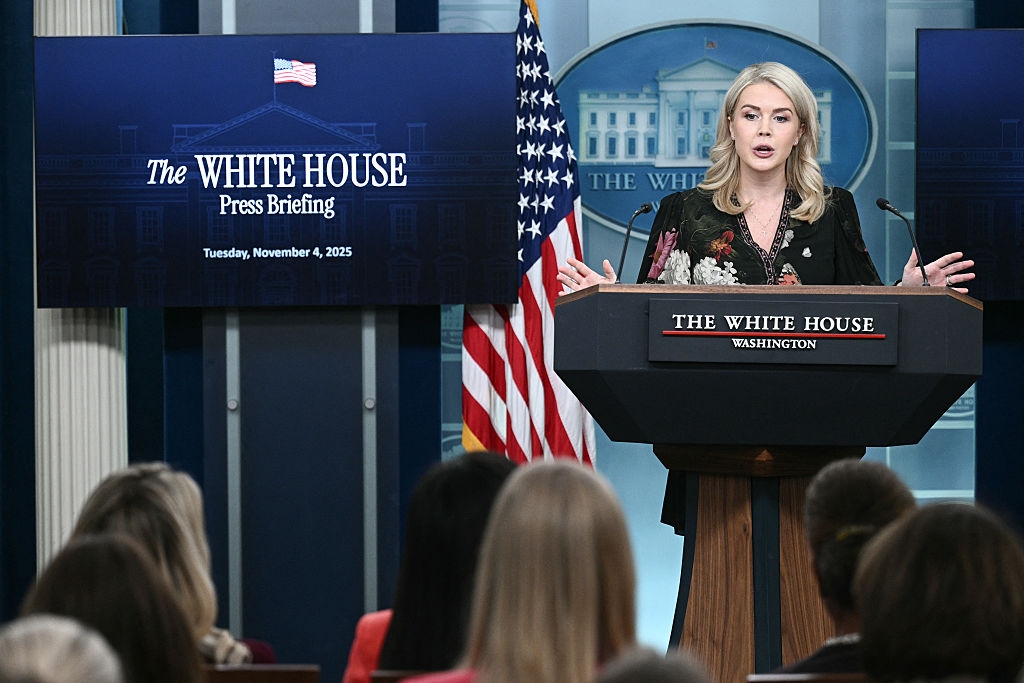White House Press Secretary Karoline Leavitt announced on November 4 that the administration is preparing an executive order aimed at enhancing the security of U.S. elections and preventing alleged fraud in mail-in ballots, following repeated claims by former President Donald Trump that California’s mail-in voting system is “rigged” and under “legal and criminal review.”

During a briefing with reporters, Leavitt stated, “The White House is drafting an executive order to strengthen our elections and make sure there is no blatant fraud, as we’ve seen in California’s universal mail-in voting system. It’s an undeniable fact that fraud exists in California’s elections.”
She added that evidence would be provided to reporters after the briefing, alleging that fraudulent ballots are being submitted in the names of others, including individuals who are not legally eligible to vote.
Leavitt’s announcement followed a post earlier in the day on Trump’s social media platform, Truth Social, in which the former president reiterated his criticisms of mail-in voting and hinted at ongoing criminal investigations into ballots cast in California. When pressed about specific authorities involved or evidence supporting these claims, Leavitt remained vague, asserting only that “fraudulent ballots are being sent in the names of other people, including illegal immigrants who should not be voting in U.S. elections.”
While details about the proposed executive order remain sparse, it is widely viewed as part of Trump’s ongoing push for sweeping election reforms. These include a nationwide ban on universal mail-in voting, the phasing out of electronic voting machines, and the implementation of stricter federal oversight over state election procedures.
Trump has repeatedly argued that mail-in voting encourages widespread fraud, a position that has drawn criticism from election law experts and Democrats, who emphasize that such claims are largely unsubstantiated.

California Redistricting Vote Adds Fuel to Debate
The announcement comes in the wake of another contentious development in California politics. On November 4, voters approved Proposition 50, a measure supported by Governor Gavin Newsom and state Democrats that temporarily allows lawmakers to bypass the state’s nonpartisan redistricting commission when redrawing congressional districts.
Supporters of Proposition 50 framed it as a necessary counterbalance to Republican-led redistricting efforts in states such as Texas. Governor Newsom described the measure as “California’s chance to save democracy,” highlighting its potential to help Democrats regain momentum ahead of upcoming elections. “At the end of the day, it’s about the future of our country,” he told supporters at a rally in Los Angeles on November 1.
Critics, however, including former President Trump, framed the measure as unconstitutional and politically motivated. Republican State Senator Tony Strickland warned that while the measure may appear advantageous in California, it could have unintended consequences nationally. “If Prop 50 passes, it becomes a rallying point nationally. The biggest winner tonight will be Donald Trump,” he told The Epoch Times, arguing that the measure could further polarize the electorate and galvanize conservative voters across the country.
Following Trump’s posts labeling the redistricting vote as unconstitutional and claiming that some California mail-in ballots are under criminal investigation, Governor Newsom dismissed the assertions, describing them as “the ramblings of someone who knows he’s about to LOSE.”
Legal and Constitutional Challenges Loom
Constitutional experts have emphasized that any nationwide action restricting mail-in voting or altering state election procedures would likely face immediate legal challenges. Under the U.S. Constitution, states retain primary authority over “the times, places, and manner” of conducting elections, while Congress holds limited powers to regulate federal elections. Rick Pildes, a political science professor at New York University, explained, “The president cannot dictate to states how to run national elections. Any changes of this magnitude would likely require congressional approval, and even then, would face scrutiny in the courts.”
If issued, the executive order would represent the latest in a series of White House initiatives aimed at tightening federal oversight of elections. In March, Trump signed an executive order directing federal agencies to update election security measures, revise voter registration procedures, and adjust mail-ballot deadlines. Although parts of that order were blocked by a federal judge for exceeding presidential authority, some provisions, such as the tightened deadlines for mail-in ballots, remained in effect.
Political Implications and Public Response
The proposed executive order has generated intense debate across political lines. Supporters argue that heightened scrutiny and stricter measures are necessary to prevent potential fraud and restore confidence in the electoral process. Critics contend that the order is largely symbolic, politically motivated, and unlikely to survive judicial review, while simultaneously threatening to undermine voter confidence in legitimate state-run election systems.
Amid these discussions, California’s recent redistricting vote adds another layer of complexity. While Democrats argue that Proposition 50 is necessary to counteract partisan gerrymandering elsewhere, Republicans contend that the measure exemplifies an overreach that disrupts traditional checks and balances in electoral oversight. These tensions underscore a broader national debate over federal authority versus state control in administering elections, and the role political rhetoric plays in shaping public perception.
Conclusion
The Trump administration’s proposed executive order on election integrity highlights ongoing tensions between federal initiatives and state-controlled electoral processes. While the White House cites concerns over alleged fraud in California’s mail-in voting system, legal experts stress that states maintain primary authority over elections, making nationwide enforcement of such an order highly unlikely.
Coupled with the controversy surrounding California’s Proposition 50 redistricting measure, the episode illustrates the intricate interplay of politics, law, and public perception in American elections. As both federal and state actions unfold, debates over mail-in voting, election security, and redistricting are poised to remain central issues in U.S. political discourse, underscoring the continuing challenges of balancing election integrity with constitutional protections and state autonomy.
Reporters Joseph Lord, Jackson Richman, and Travis Gillmore contributed to this report.
